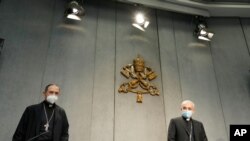Pope Francis has made sweeping changes to Catholic Church law on sexual abuse crimes. The changes are aimed not only at punishing those in the church who commit such crimes, but also at making it harder for church officials to cover up offenses by priests.
While abuse of minors was previously an offense under the title “Crimes Against Special Obligations,” it has now been moved to “Offenses Against Human Life, Dignity and Liberty.”
Monsignor Filippo Iannone, head of the department charged with the project, explained the intention behind this change.
The aim, he said, was to re-affirm the gravity of this crime and the attention that must be reserved for the victims.
Since his election in 2013, Pope Francis has been speaking out against sexual abuse in the church and implementing changes aimed at bringing those responsible to justice. He has made great efforts at trying to bring more transparency and avoid cover-ups of those involved in abuse.
Presenting the changes on Tuesday, Vatican officials said they will go into effect on December 8, the day the church celebrates the Feast of the Immaculate Conception.
The changes made to canon law recognize that both minors and adults can be victims of abuse. In addition, both clergy and lay people who hold church positions will have to answer for sexual offenses.
While members of the church can be defrocked, lay people will pay for their offense either by losing their jobs or their place in their communities or will receive fines.
New crimes have also entered the code such as “grooming” minors or vulnerable adults for sexual abuse and possessing child pornography.
The changes also make it much more difficult for abusers to benefit from superiors covering up as this will no longer be tolerated and those who do not act against offenders will be held responsible and punished for their negligence.
Monsignor Iannone said there was the need to strengthen the criminal code because of some existing situations of irregularity in communities, but above all - as he put it - because of “recent scandals with disconcerting and very serious episodes of pedophilia.”
He also said there has been “a climate of excessive slack in the interpretation of penal law,” where mercy was sometimes put before justice.
Monsignor Iannone concluded by saying that justice requires that the order that has been violated be re-established, that victims be eventually compensated and that offenders be punished and pay for their crimes.





